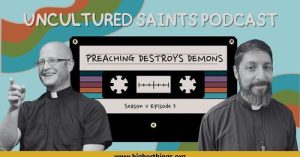John 8:31-36 Reformation Sunday (Observed)
The mere fact that we have a belly button reveals that we are connected to someone. We did not enter this world on our own. Our identities are initially determined by someone else. Most us probably know where that identity came from, in other words, we know our parents, were raised by them, and whether we like it or not we usually end up looking like them and sounding like them. But for those who do not know where they came from, like an orphan or one who was adopted, there is often this inner drive to find out where you came from, who you are. What is your identity?
To have an identity is to be rooted. It is a human necessity. Since we had to come from somewhere and from someone, we have this need to know from whence we came so that we can deal with today and even begin to think about the future. Those who do not or cannot identify with anyone are called antisocial at best and psychopathic at worst.
Having an identity is so important. Why do you think soon-to-be-parents struggle through lists of names? What about if your identity has been stolen? Why is there such a feeling of violation if identity doesn’t matter?
Look, I think we can all admit that having an identity is important and necessary. But that doesn’t keep us from abusing or demeaning this reality. In the secular world your identity is boiled down to occupation, political party affiliation, or mere demographic data. By various identities, you are reduced to a unit of production or a unit of consumption. You don’t think so? Just think of how businesses no longer have Personnel Departments, they have Human Resource Departments. Because that is all you are, a human resource for the company, indistinguishable from a mechanical resource. You are identified as a unit of production to be used to sell something to all those units of consumption out there. Talk about psychopathic.
Even in the religious realm people like to have an identity. “I am Buddhist, I am an atheist, I am Jewish.” Within Christianity there all kinds of different identities; “I am a Catholic, I am a Lutheran, I am non-denominational.” And even those identifications can be misleading. How many people are baptized, and confirmed in the Lutheran Church and then soon after leave the church or go whoring after other heretical confessions, yet they still say that they are Lutheran? Maybe they haven’t darkened the door of a church for 20 years and have turned their back upon the Body of Christ, but, by God they identify themselves as Lutheran. This is the kind of nonsense that Jesus addresses in our text this morning. Understanding your identity and where you came from and who belong to is at the center of the 8th chapter of John and at the center of the Reformation itself.
Jesus is making identifications and defining relationships. He is identifying who His disciples are and defining how they will relate to Him, and He to them. A disciple of the one true God is one who remains in the Word. Now to give you a better understanding of what that means in the Gospel of John, think of how the book starts. In the Beginning was the Word and the Word was with God and the Word was God…the Word became flesh and dwelt among us. The Word is Jesus. Jesus is the walking talking Bible in the flesh. When a phrase like, “remain in the Word” is voiced, you might as well just say “remain in Jesus.” Well….wait a minute…Jesus does say that later in John 15. There and in John 6, He tells us that we remain in Him by having Him come to us and remain in us. He is the vine and we are the braches. Whoever eats His flesh and drinks His blood will abide in Him and He in them, and have eternal life.
The other part of that opening statement Jesus makes, “you will know the truth, and the truth will set you free” is also a self-reference. Again Jesus later in John says that He is the Way, the Truth, and the Life. So let’s rephrase this whole statement; “If you abide in Me you are truly my disciples and you will know Me and I will set you free.”
Folks, your identity is in Christ. But the temptation to deny that identity is great. The Jews sought to identify themselves through Abraham. They could trace their genealogy back to him and they were circumcised, so in their minds, they were in like Flynn. They belonged to the house of promise, they were the sons of Abraham and Isaac, not sons of that half-brother slave Ishmael. They were sons of the house and were receivers of YHWH’s covenant of salvation. But our Lord Christ was sent first to the house of Abraham, Isaac, and Jacob and they perceived Him not. They drew their identity from their own mind and not from God. In reality, they enslaved themselves to themselves when Our Lord, all along, desired to free them from themselves by binding them to Himself.
Sometimes you too are like the Jews here in the text. You seek to identity yourself. You would enslave yourself to things that you think are more important, like family, country, money, or the probably the biggest golden calf that is worshipped in our country, sports. You try to claim for yourself what was given by God. “This is my body, I can do what I want with it.” “This is my church and we do things this way.”
You want to create your own identity apart from our Lord, forgetting that it was our Lord who created and re-created you in His image and likeness. You desire to define your relationship with God. Your desire is to be like God, thinking that you know good and evil and judging everyone who does not fit into your parameters. You would enslave others to yourself but in reality all you do is enslave yourself to yourself. Stop it! Repent! This is not what you learned in Christ!
When you were baptized you became a true son and daughter of Abraham, for the same faith that Abraham was given, has been credited to you as well. Those who believe in the Son of God as Savior of the world and cling to the fruits of the cross are truly His disciples. At your baptism, the Lord placed His name upon you, Father, Son, and Holy Spirit. You belong to Him. Your identity comes from Him. You do not belong to yourself, you belong to our Lord.
And you remain or abide in Jesus because He freely gives Himself to you. Jesus enters into you through your ears via the Word that is read and proclaimed. He enters through your mouths and into your hearts. There is no closer communion with our Lord than in Holy Communion. By receiving the Son you receive the gifts of the Son and you are set free. You are free from the condemnation of the Law. You are free from the burden and guilt of sin. You are no longer slaves to it. Therefore, you are also free from paying the wages of sin which is death. Not even the tomb can enslave you. For our Lord Christ has defeated death and just like Christ, you too will be resurrected on the last day. The stone has been rolled away and the guards have been taken care of. The linen cloths that would bind you as Lazarus, have been set aside and folded neatly so that you walk out of the tomb as free as free can be.
All this freedom because our Lord freely gives it to you. There is complete and total freedom in being identified and defined by Christ. To search for something outside of Christ crucified is find enslavement. By your baptism, you belong to Him. Your identity is so wrapped up in Christ’s identity that the Father cannot even separate the two. For the Father looks at you cross-eyed. He sees the perfect, cruciform image of His Son upon you and you receive all the benefits that a son would receive. You are not a bunch of enslaved Ishmaels. You are Isaacs. You receive the full inheritance and are free because you are forgiven all of your sins; in the Name of the Father, and of the Son, and of the Holy Spirit.



